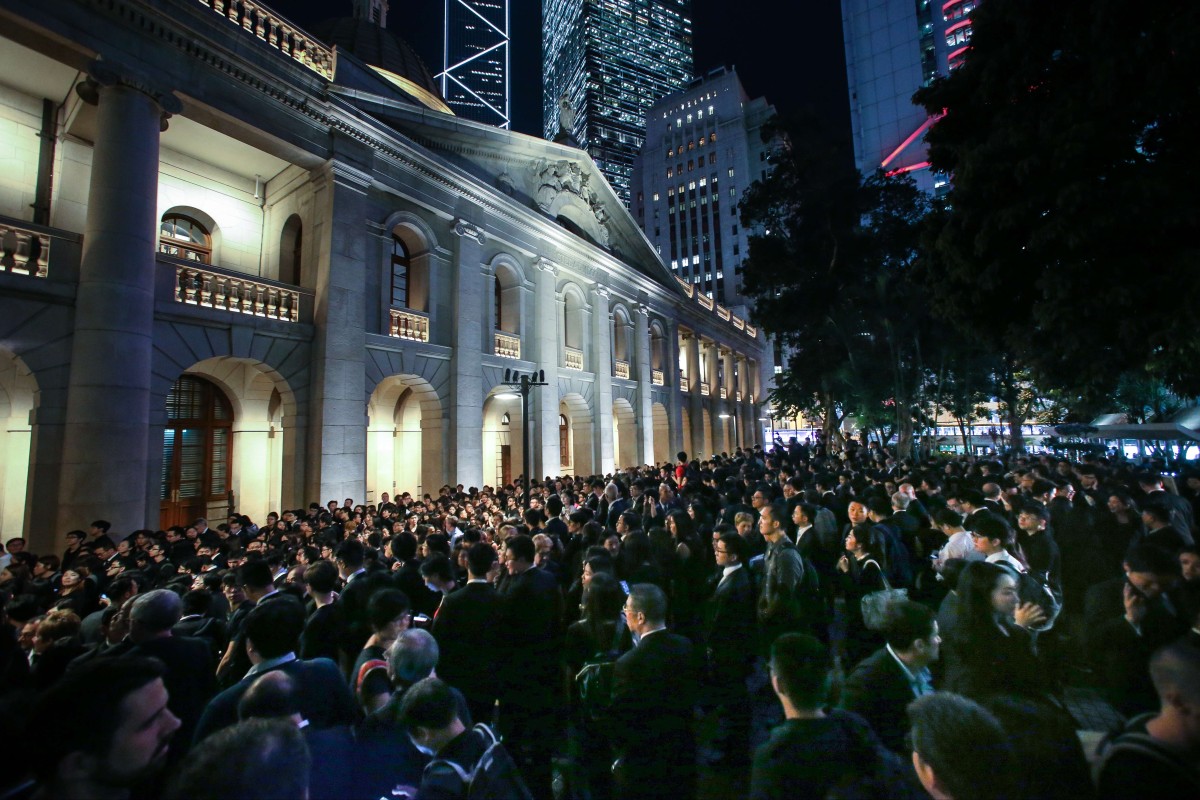 Lawyers against the Beijing intervention stand outside the High Court.
Lawyers against the Beijing intervention stand outside the High Court. Hundreds joined a silent march by the legal profession on Tuesday night in protest against the intervention by Beijing in a controversial oath-taking case, claiming it harms judicial independence.
However a Basic Law adviser to Beijing said it was up to a local court to decide whether the mainland ruling banning pro-independence lawmakers Sixtus Baggio Leung Chung-hang and Yau Wai-ching was retrospective and posed a legal challenge for more pan-democrat lawmakers over the way oaths were taken.
March organiser and legal-sector lawmaker Dennis Kwok said more than 2,000 people joined the protest. Police put the turnout at 1,700.
It was the fourth silent march staged by lawyers against Beijing’s intervention in the judicial system since the handover in 1997.
On Monday, the National People’s Congress Standing Committee (NPCSC) issued its interpretation of Basic Law Article 104, ruling that lawmakers must be “sincere” and read the prescribed oath “completely, accurately and solemnly”. Those who do not comply face instant disqualification.
The lawyers say the ruling pre-empted a local court, which had heard arguments – and is yet to give a decision – over a judicial review sought by the government to disqualify the two localists who insulted China while taking their oaths last month. Some marchers said they did not agree with the localists, and had joined the rally to defend the city’s legal system.
Rachel Lee, a 21-year-old marcher and a law student from the University of Hong Kong, told Young Post yesterday that the march was to send a clear message that they were defending the core values of the city, including judicial independence, rule of law, equality before the law and separation of power.
“The interpretation of the Basic Law shouldn’t have happened in the first place. The NPCSC issued an ‘interpretation’, which effectively amounts to an amendment to the Basic Law, before the court has decided on the pending judicial review case. It is not just a problem of ‘bad timing’, but a blatant disregard for Hong Kong’s judiciary, promises of high degree of autonomy, and One Country Two Systems. The move was arbitrary and tyrannical,” Lee said.
A timeline of the oath taking drama
November 8, - Two more Hong Kong localists could be disqualified; Nathan Law and Lau Siu-lai at risk after Beijing ruling
November, 2 - Legco chaos and fighting on the floor as two localists storm the meeting
November, 1 - CY Leung ‘can’t rule out’ asking Beijing to interpret Basic Law over Hong Kong oath-taking saga
October, 26 - Localists defy oaths ban and attend Legco meeting
October, 26 - Hong Kong Legco president makes U-turn on oath-taking by localists
October, 19 - Legco chaos as lawmakers storm out, oath-taking postponed and luncheon meat hurled
October, 18 - Andrew Leung invalidates the oaths of lawmakers Lau Siu-lai and Wong Ting-kwong
